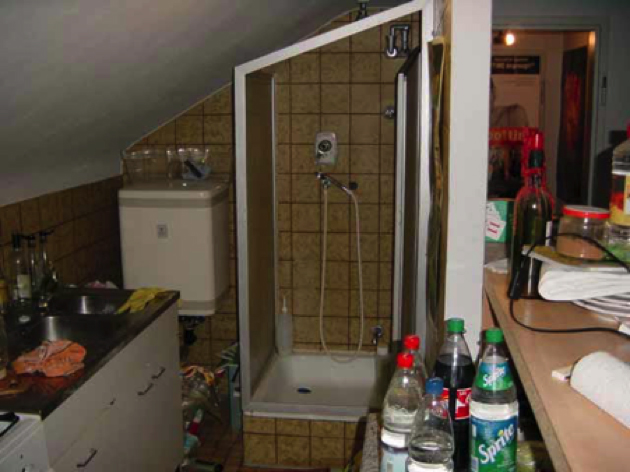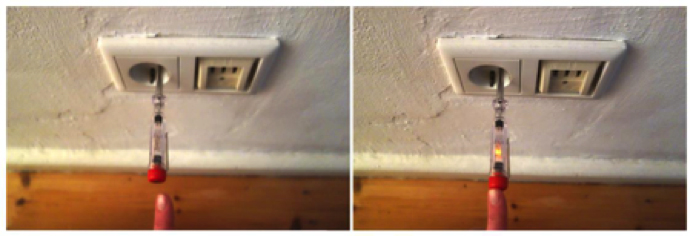When I was at the beginner level in German, I was surprised to learn, along with fundamentals like Wie geht’s Dir? or Es geht mir gut, this rather innocuous phrase: Die Küche ist ganz neu! Or, “the kitchen is brand new!” Funny. It’s not what you’d consider one of the stepping stones of a language, something to be repeatedly drilled into memory after learning how to ask how someone’s day is going. But sure enough, it reappeared over and over in my textbooks as well as in Duolingo, which, to be fair, has a lot of strange sentences made to trip English-speakers up (Die Fahrt ist lang) or, conversely, fall into deep despair (Du bist nur durchschnittlich). “I guess Germans just like to be in the kitchen,” I naively thought. But after living in Germany for some time I’d like to add a few more useful kitchen phrases.
Es gibt keinen Herd. There is no stove.
Es gibt keinen Kühlschrank. There is no fridge.
Es gibt keinen Herdanschluss. There is no plug for a stove.
Warum ist die Dusche in der Küche? Why is the shower in the kitchen?
Du nennst dies eine Küche? You call this a kitchen?
Wie soll man denn hier kochen?! How can I even cook here?!
That’s right, if you’re not adequately prepared, you may be stuck eating curry wurst everyday for the first week, or month, of your new Deutsch life. “No problem,” you think, “Berlin attracts so many newcomers because housing is dirt cheap. I can rent a huge place, set up a new kitchen and I’ll still be at a fraction of the price I’d pay back home.” Well, depending on where home is, that may be true, but the reality of 100 square meter apartments with over 3 meter tall ceilings at laughably low prices is currently a thing of the past. In the Berlin of the 90s and early 2000s, people had found their homes simply by taking over empty buildings. Prenzlauer Berg, now overrun by the latest in ergonomic strollers, was once the heart of Berlin counter-culture because the empty buildings were simply taken over by artists and other creative types. Today Neukölln is one of the hipper, bohemian neighborhoods though the days of finding a place by squatting are long gone. In a book excerpt from Jan Brandt in the May 12 Sunday Frankfurter Allgemeine—usually shortened to the FAZ but the Sunday edition is the FAS—the experience of apartment hunting, which is something of a hamster wheel at best, is described firsthand. Titled Freiwillige Selbstauskunft (an at times dubious requirement described in the first article), the author vividly wrote about his attempt to rent an apartment he had previously lived in during his student days. He, and approximately 50 other prospective renters, was explicitly asked to fill out a form that included yes or no questions about social assistance (Sozialleistung), previous arrests (Haftbefehlen), foreclosure (Zwangsvollstreckung), pets (Haustiere) and musical instruments (Musikinstrumente). You’ll know, if you read the first piece in this series, that some of these questions are not permitted. In any case, despite attempting to develop a personal bond with the owner and having a stable income, he didn’t get the apartment, which wasn’t even the place of his dreams as much as a pang of nostalgia for the ascetic lifestyle of the DDR (Deutsche Demokratische Republik).
One of the more “historic” features of some German apartments is the so-called Frankfurter Bad, which is a shower in the kitchen. Like the name suggests, this clever innovation is often found in Frankfurt homes built at the turn of the 20th Century, though this luxury is certainly not isolated to Germany’s financial center. In the 1900s it was uncommon to even have a bathroom in the house. You counted yourself lucky if the unheated water closet was a communal room at the end of the hall, rather than a shed downstairs in the courtyard. Because the connections for heat and water were only to be found in the kitchen, people installed their bathtubs there too. Later, when actual washrooms were installed, it was easier to leave the shower or bathtub in place and build a water closet with just a toilet and a small sink.

( https://www.macelodeon.de/bilder/bad-oder-kueche )
In Berlin you could get the additional surprise of having to heat your apartment with a coal oven, ein Kohleofen—a rather laborious and environmentally unfriendly heating solution that doesn’t seem to make the suite any less desirable to house-seekers. After a three-month search, a friend of mine, in order to have an edge over the other eager candidates, offered the landlord one year’s rent in advance for a small Dachgeschoss. She swears that coal keeps the room quite toasty, though it takes a few hours to warm up and she is stuck carrying heavy bags up to the fourth floor. Lucky for her, the tiny apartment only has one room.
These old fixtures of German life are gradually disappearing in the big cities where the impetus to modernize has become a curse for the local population. Modernisierung is a codeword for higher rent, and worse, eviction, though many private owners will have kept their buildings in historic condition. That means, depending on how much you are willing to pay (which is still less than you’d pay in many other international centers!), you can still find huge apartments with heavy wooden door frames and windows on either side of the flat. These sprawling 19th and early 20th century bourgeois homes will often have what’s called a Berliner Zimmer, which is usually used as the bedroom since all its windows face into the courtyard, or Hof, meaning that it doesn’t get much sunlight. From the window of the Berliner Zimmer is where you’ll get an intimate glimpse into Berlin life. Berliner Hofs are filled with the smells of other people’s kitchens, the echoes of their conversations, their laughter and sometimes their tears. Many of these old apartments have been since subdivided, creating some unique spaces if you find yourself living in one of the side wings, or the Seitenflügel. These were usually the servant’s quarters, who had to use the Diensbotenaufgang to reach their homes. These stairwells are markedly narrower and steeper than that of the main entrance in the Vorderhaus, which means, if you find a home on the fourth floor, you may either throw out some of your larger possessions or move them in through the window using a crane. Many of these old buildings do not have an elevator but since it was not permitted to build anything above four floors, you won’t ever have to climb too high.
You will likely have to do some climbing of another sort, however. Altbaus in Germany will have majestically tall ceilings but it’s common for the tenants to install all their own light fixtures. Where you’d expect a light, there will just be a couple of wires, two or three, hanging from the ceiling in the middle of the room. To install the light, you’ll need to find a steady ladder, eine Leiter, and a screwdriver, Schraubenzieher, that absorbs electricity. Call me sheltered, but this is something that I had never heard of before. I was wisely taught never to stick metal objects into light sockets but in Germany, this isn’t a fast rule. You see, if you’re installing a fixture four meters high in the middle of a room, you don’t want to be unexpected jolted to the floor by 240 volts. But how do you find out if the light is on or off? You buy a screwdriver that you, with all confidence, can stick into a socket. These handy little things have a metal plate at the end, that you touch with your finger when the screwdriver is in a socket or touching a wire. If there is electricity flow, a light in the handle will dimly glow. If not, nothing happens. With this tool you can test all wires and fixtures in your house before you start handling them with your bare fingers.

Of course, you can spare yourself all this hassle and simply get a möblierte Wohnung, which is a furnished apartment. This way you’ll be safe from live wires, missing kitchens and any other unexpected dangers that might come with your first home in Germany. But you’ll also be sparing yourself a lot fun. Viel Spaß!
Wortschatz:
der Altbau – a term used to refer to pre-WWII buildings
das Berliner Zimmer – room with windows facing into the courtyard
das Dachgeschoss – top floor, attic
DDR – Deutsche Demokratische Republik
GDR – German Democratic Republic
der Dienstbotenaufgang – the servants entrance
die Einrichtung – furnishing, arranging, setting up
Frankfurter Allgemeine – a daily national paper in Germany
das Frankfurter Bad the Frankfurt bathroom
Freiwillige Selbstauskunft – voluntary disclosure of information
der Haftbefehl – warrant of arrest
das Haustier – pet
der Hof – courtyard
der Kohleofen – coal oven
die Leiter – ladder
die Modernisierung – modernization
das Musikinstrument – music instrument
möbliert – furnished
der Schraubenzieher – screwdriver
der Seitenflügel – side wing
die Sozialleistung – social assistance
das Vorderhaus – main wing (in a house)
die Zwangsvollstreckung – foreclosure
Viel Spaß! – Have fun!
Die Fahrt ist lang. – The journey/trip is long.
Du bist nur durchschnittlich – You are only average.
Die Küche ist ganz neu! – The kitchen is brand new!
Wie geht’s Dir? – How are you?
Es geht mir gut. – I’m doing well.
Es gibt keinen Herd. – There is no stove.
Es gibt keinen Kühlschrank. – There is no fridge.
Es gibt keinen Herdanschluss. – There is no plug for a stove.
Warum ist die Dusche in der Küche? – Why is the shower in the kitchen?
Du nennst dies eine Küche? – You call this a kitchen?
Wie soll man denn hier kochen?! – How can I even cook here?!
This post was written by Conrad Smith.
